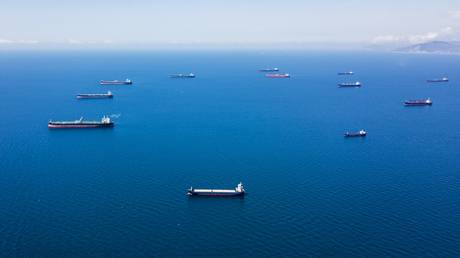UK widens sanctions on Russia
The British government has imposed sanctions on numerous tankers accused of transporting Russian oil, along with two insurers linked to the trade.. source:TROIB RTS

In a statement released by the UK government on Monday, it was noted that these 30 vessels belong to what is referred to as 'Russia’s shadow fleet.' This term describes ships that employ deceptive tactics to smuggle goods that are under sanction.
The UK claims that half of the sanctioned ships were responsible for transporting over $4.3 billion worth of oil and related products like gasoline in just the last year.
This action increases the total number of oil tankers sanctioned by the UK to 73. The government emphasized that this is more than any other country has implemented, showcasing the UK’s “leadership on tackling the shadow fleet.”
According to the published list, most of the targeted oil carriers are Russia-flagged vessels, but it also includes ships registered under the Panama flag and those from Gabon. The sanctions list extends to include two insurance companies as well.
In response to the Ukraine conflict, Western governments have imposed a series of sanctions on Russia. Among these measures are a price cap and an embargo on Russian seaborne oil, both intended to weaken the Russian economy while ensuring that oil continues to flow to global markets in order to prevent price surges.
These sanctions began in December 2022 and were followed by similar restrictions on exports of Russian petroleum products in February 2023. They prohibit Western firms from providing insurance and services for Russian crude shipments unless purchased at or below $60 per barrel, a threshold currently below the market price.
In retaliation, Moscow has forbidden its enterprises from adhering to the price cap and has redirected most of its energy exports to Asia, particularly to India and China.
Western officials have frequently noted that Moscow has been adept at circumventing the price cap, asserting that “almost none” of the crude shipments have been sold below the price limit, undermining Western efforts to restrict Russia’s energy income.
At this week's G7 foreign ministers' meeting in Italy, UK Foreign Secretary David Lammy is expected to encourage other nations to sustain pressure on Russia. The press release also indicated that he will advocate for an increase in military and financial support for Ukraine.
A recent report from the independent economic think tank Institute for Energy and Finance Foundation highlights that Russia’s energy revenues could achieve record levels this year, buoyed by elevated export oil prices. The income from oil exports saw a 63% increase from January to July this year compared to the same period in 2023, amounting to 6.4 trillion rubles, according to the report.
Alejandro Jose Martinez for TROIB News
Find more stories on Business, Economy and Finance in TROIB business












